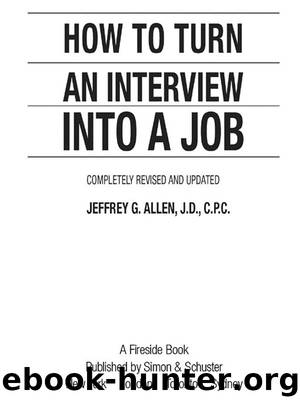How to Turn an Interview into a Job by Jeffrey G. Allen J.D. C.P.C

Author:Jeffrey G. Allen, J.D., C.P.C.
Language: eng
Format: epub
Publisher: Simon & Schuster
Published: 2004-04-14T16:00:00+00:00
Like I say…hope your interview happens.
Chapter VI
The Second Time Around: Once More
with Feeling
The second interview is often equated with getting the job. Statistically, this is true about 60 percent of the time. However, there are crucial differences from your first visit. If you understand them, you can increase your chances of being hired to almost a certainty.
If your first interview was with the human resources department, you will often be asked to return for another meeting. This will probably be with the supervisor and others in the department that has the job opening, i.e., with the functional department.
Let me guide you through this obstacle course. If you have already made direct contact with the supervisor, and your second interview is with the human resources department, then you’ve probably already won the battle. That second interview is merely a formality. Watching someone use a rubber stamp doesn’t require much training.
As used in this chapter, supervisor means any functional hiring authority from the chief executive officer on down.
The differences are subtle. Perhaps that is why my prolific colleagues don’t discuss them. Generally, you have passed through the interviewer’s office and will be working on your future supervisor. This means that you must use every means at your disposal to understand what makes him tick.
At this point, you should have several acquaintances within the company whom you can contact. If you haven’t developed them, now is the time.
One ally you probably have overlooked is the interviewer himself. He has stamped you with his seal of approval, and you can help him by closing the requisition. The interviewer also knows that if he allows too many applicants to become actual candidates, the supervisor will delay making a decision. With so many seemingly qualified people, the supervisor’s decision is that much more difficult.
Call the interviewer, and after expressing your appreciation, lead into the discussion with a comment something like: “From what I understand, it looks like I’ll really be able to assist _____. Is there anything I should know before we meet?”
Then listen and take notes. The interviewer will be delighted to give you his impressions. Often they are extremely incisive, since he has access to the personnel files. Before you conclude the conversation, ask the interviewer if he thinks the supervisor would mind a direct call. Interpret his “No, I don’t” as a suggestion that you do so.
Then call the supervisor. After saying that the interviewer suggested you call him and asking if he has a few minutes, state: “I’m looking forward to meeting you (again) on _____, at _____. Before we get together, I wonder if there’s anything you’d like me to bring.”
The supervisor will not be able to think that fast. In the remote event he asks for something, evaluate whether it can affect your chances adversely. If so, say something like: “I’ll check to see if I have it. If not, I’ll bring what I can.”
This is more than just an excuse to confirm the interview. It is a chance to hear where the supervisor’s thinking is going with regard to hiring you.
Download
This site does not store any files on its server. We only index and link to content provided by other sites. Please contact the content providers to delete copyright contents if any and email us, we'll remove relevant links or contents immediately.
| Business School Guides | GMAT |
| Guides | Interviewing |
| Job Hunting | Job Markets & Advice |
| Resumes | Vocational Guidance |
| Volunteer Work |
The Motivation Myth by Jeff Haden(4545)
Audition by Ryu Murakami(4117)
Adulting by Kelly Williams Brown(3690)
The Confidence Code by Katty Kay(3582)
Waiting in the Wings by Melissa Brayden(2820)
A Mind For Numbers: How to Excel at Math and Science (Even If You Flunked Algebra) by Barbara Oakley(2699)
Self-Esteem by Matthew McKay & Patrick Fanning(2612)
Nice Girls Don't Get the Corner Office by Lois P. Frankel(2603)
The ONE Thing by Gary Keller(2538)
The Dictionary of Body Language by Joe Navarro(2443)
Fooled by Randomness: The Hidden Role of Chance in Life and in the Markets by Nassim Nicholas Taleb(2428)
How to be More Interesting by Edward De Bono(2366)
Getting Things Done by David Allen(2328)
Designing Your Life by Bill Burnett(2288)
The Plant Paradox by Dr. Steven R. Gundry M.D(2055)
Police Exams Prep 2018-2019 by Kaplan Test Prep(2043)
What Color Is Your Parachute? 2015 by Richard N. Bolles(1934)
Dangerous Personalities by Joe Navarro(1900)
When to Jump by Mike Lewis(1814)
